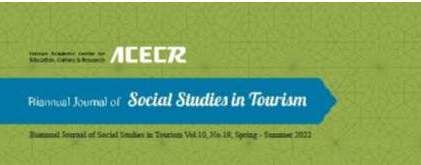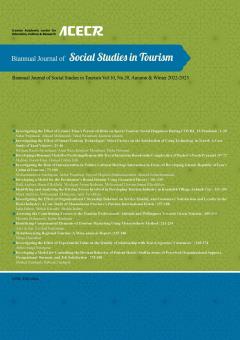Assessing the Contributing Factors to the Tourism Professionals’ Attitude and Willingness Towards Green Tourism
Subject Areas :mostafa mahmoudi 1 * , Bahar Bishami 2
1 - Allameh Tabataba’I University
2 - science Committee
Keywords: Green Tourism, Sociology of Religion, Collectivism, Environmental knowledge, Environmental Concerns.,
Abstract :
Environmental crises and the destruction of natural resources are the main problems faced by the tourism industry, whose treatment requires concerted efforts to change the needs and behaviors of tourists and to offer green products and services. In this regard, as tourism professionals play an important role in directing the market towards special styles and behaviors, especially environmentally friendly and sustainable behaviors, investigating the factors involved in shaping the attitude and tendency of such professionals to green tourism can help attract the attention of other beneficiaries to this field. The required data for this developmental/applied and descriptive/survey study was collected through a 31-item questionnaire administered to some 102 professionals in the tourism industry who were selected via purposive sampling. The data were then analyzed in the following two parts using the Structural Equation Modeling: 1) the measurement model to be used for examining the technical characteristics of the questionnaire and 2) the structural part to test the research hypotheses. The study’s findings indicated the direct positive influence of religiosity on collectivism, and the indirect effect of religiosity on other variables considered in the study. Moreover, while a positive correlation was found between collectivism, environmental concerns, environmental knowledge, and the tendency toward green tourism, no correlation was observed between religiosity and environmental knowledge, and between environmental knowledge and environmental concerns. Therefore, it is recommended that some courses be added to educational levels concerning how to protect the environment when traveling.
اسدی، معصومه و محرابی، محبوبه. (1397). «بررسی عوامل زمینهای و اجتماعی مؤثر بر رفتارهای زیستمحیطی شهروندان بندرعباس». پژوهشنامه فرهنگی هرمزگان. دوره 10، شماره 15، 118-132.
اسکات، جولى و هال، آيرين. (1386). دين و جامعهشناسى. ترجمه: افسانه نجاريان. تهران: رسش.
پازکی، معصومه و یوردخانی، مختار. (1393). «واکاوی و بررسی عوامل مؤثر بر توسعه گردشگری سبز روستایِ توچال (بر اساس روش تئوری بنیادین)». فصلنامه نگرشهای نو در جغرافیای انسانی. سال هفتم، شماره 1، 237-248.
پورجمشیدی، حدیث؛ مهدی زاده، حسین؛ غلامرضایی، سعید و شیری، نعمت اله. (1395). «عوامل مؤثر بر گرایش به رفتار مصرف پایدار: موردمطالعه شهر خرمآباد». فصلنامه علمی آموزش محیطزیست و توسعه پایدار. دوره 4، شماره 4، 55-64.
حاجیزاده میمندی، مسعود؛ سیار خلج، حامد؛ شکوهیفر، کاوه. (1393). «بررسی عوامل فرهنگی مرتبط با رفتارهای محیط زیستی(موردمطالعه: شهر یزد)». جامعهشناسی اقتصادی و توسعه. دوره 3، شماره 1، 83-107.
حاجیلو، فتانه؛ علیزاده، محمدباقر؛ سولماز سقلی، اقدم. (1399). «رابطه سواد بومشناختی، سرمایه اجتماعی و رضایت از زندگی با دغدغه محیط زیستی (مطالعه موردی دانشجویان دانشگاه تبریز)». فصلنامه علوم محیطی، دوره 18، شماره 4، 69-84.
خلیل، میرزایی؛ آقاسیدحسنی، لیلا؛ فلاحی، علی. (1395). «رابطۀ دینداری و عضویت افراد در شبکههاي اجتماعی نیکوکاري». دو فصلنامه علمی- پژوهشی دین و ارتباطات. سال بیست و سوم، شماره دوم، 147-174.
داوری، علی و رضازاده، آرش. (1392). مدلسازی معادلات ساختاری با نرمافزار PLS. تهران: انتشارات جهاد دانشگاهی.
دورکیم، داوید امیل. (1398). درباره تقسیم کار اجتماعی. ترجمه: باقر پرهام. تهران: مرکز.
سرمد، زهره؛ بازرگان، عباس؛ حجازی، الهه. (1398). روش تحقیق در علوم رفتاری. تهران: آگه.
سیما، فردوسی؛ مرتضوی، شهرناز؛ رضوانی، نعیمه. (1386). «رابطه بین دانش محیطزیستی و رفتارهای محافظت از محیط». پژوهشنامه علوم انسانی. شماره 53، 252-266.
شارپلی، ریچارد. (1380). گردشگری روستایی. ترجمه: رحمتالله منشیزاده و فاطمه نصیری. تهران: نشر منشی.
شجاعیزند، علیرضا. (1384). «مدلی بر سنجش دینداری در ایران». مجله جامعهشناسی ایران. دوره ششم، شماره اول، 34-66.
صالحی، صادق و امامقلی، لقمان. (1391). «مطالعه تجربی رابطه آگاهی و رفتارهای زیستمحیطی». مسائل اجتماعی ایران. دوره 3، شماره 1، 121-147.
صالحی، صادق. (1393). «رفتارهای زیستمحیطی، دانش زیستمحیطی و تحصیلات». مجله علوم تربیتی. دوره 18، شماره 2، 226-201.
ضیایی، محمود و تراب احمدی، مژگان. (1392). شناخت صنعت گردشگری با رویکرد سیستمی. تهران: نشر علوم اجتماعی.
غروی، سید محمد؛ کاویانی، محمد؛ خداپناهی، محمدکریم؛ عباسی، اکبر؛ سالاریفر، محمدرضا؛ تبیک، محمدتقی؛ موسویاصل، سید مهدی؛ آذربایجانی، مسعود. (1393). روانشناسی اجتماعی با نگرش به منابع اسلامی. تهران: سمت.
قلیپور، آرین. (1396). مدیریت رفتار سازمانی. تهران: سمت.
کلانتری، خلیل. (1388). مدلسازی معادلات ساختاری در تحقیقات اجتماعی-اقتصادی. تهران: انتشارات فرهنگ صبا.
گیدنز، آنتونی، (1392). پیامدهای مدرنیت. ترجمه: محسن ثلاثی. تهران: نشر مرکز.
نبوی، سید عبدالحسین و شهریاری، مرضیه. (1393). «دین، اخلاق و محیطزیست». مجله انسان و محیطزیست. دوره 12، شماره 2، 69-83.
نواح، عبدالرضا؛ فروتن كيا، شهروز؛ پورتركاروني، محمد. (1390). «بررسي رابطه بين ميزان دینداری با ارزشها و رفتارهاي زيستمحيطي شهروندان (مطالعه موردي: شهر اهواز)». مطالعات جامعهشناختي شهري. دوره 1، شماره 1، 77-97.
نیازی، محسن و کارکنان نصرآبادی، محمد. (1392). «بررسی رابطه بین میزان دینداری و سبک زندگی شهروندان: مطالعه موردی شهروندان شهرستان کاشان در سال 1390». فصلنامه برنامهریزی رفاه و توسعه اجتماعی. دوره 5، شماره 16، 213-273.
وبر، ماکس. (1394)، دین، قدرت، جامعه. تهران: هرمس.
Ajzen, I. (1991). The theory of planned behavior. Organizational Behavior and Human Decision Process. 50, 179–211.
Alba, J.W. and Hutchinson, J.W. (1987). Dimensions of consumer expertise. Consumer Research. Vol. 13 No. 4, 41-454
Asunta, T. (2003). Knowledge of environmental issues. Psychological and Social Research. Permission of social of faculty of education of University of Jyvaskyla in Auditorium S212.
Ayodeji, I. (2010). Exploring secondary school student understanding and practices of waste management in Ogun State. Environmental & science Education. 5(2). 201-215.
Bamberg, Sebastian. (2003). How does environmental concern influence specific environmentally related behaviors? A new answer to an old question. Environmental Psychology. Volume 23, Issue 1, 21-32.
Beisner, E.C. (2000). A biblical perspective on environmental stewardship. available at: www.acton. org/public-policy/environmental-stewardship/theology-e/biblical-perspective-environmental-ste wardship (accessed 5 December 2020).
Bulter, Richard. (1999). Problems and issues of integrating tourism development, Book chapter: contemporary issues in tourism development. London: Rutledge.
Chai, L.T. and Chen, T.B. (2009). Religiosity as an antecedent of attitude towards green products: an exploratory research on young Malaysian consumers. Asean Marketing Journal. Vol. 1 No. 1, 29-36.
Chan, T.S. (1996). Concerns for environmental issues and consumer purchase preferences: a two-country study. International Consumer Marketing. Vol. 9 No. 1, 43-55.
Cheah, I. and Phau, I. (2011). Attitudes towards environmentally friendly products: the influence of eco-literacy, interpersonal influence and value orientation. Marketing Intelligence and Planning. Vol. 29 No. 5, pp. 452-472.
Chen, T.B. and Chai, L.T. (2010). Attitude towards the environment and green products: consumers’ perspective. Management Science and Engineering. Vol. 4 No. 2, 27-39.
Cho, Y.N., Thyroff, A., Rapert, M.I., Park, S.Y. and Lee, H.J. (2012). To be or not to be green: Exploring individualism and collectivism as antecedents of environmental behavior. Business Research. Vol. 66 No. 8, 1052-1059.
Dunlap, R.E. and Jones, R.E. (2002). Environmental concern: conceptual and measurement issues. in Dunlap, R.E. and Michelson, W. (Eds), The Handbook of Environmental Sociology, Greenwood Press, Greenwich, 482-524.
Fang, W. Lien, C. Huang, Y. Han, G. Shyu, G. Chou, J. & Ng, E. (2018). Environmental Literacy on Ecotourism: A Study on Student Knowledge, Attitude, and Behavioral Intentions in China and Taiwan. Sustainability. Vol. 10 No. 6, 1886-1908.
Felix, R. and Braunsberger, K. (2016). I believe therefore I care: the relationship between religiosity, environmental attitudes, and green product purchase in Mexico. International Marketing Review. Vol. 33 No. 1, 137-155.
Fraj, E. and Martinez, E. (2006). Environmental values and lifestyles as determining factors of ecological consumer behaviour: an empirical analysis. Consumer Marketing. Vol. 23 No. 3, 133-144.
Fuhrer, U. (1995). Sozialpsychologisch fundierter Theorierahmen fur eine Umweltbewusstseinsforschung. Psychologische Rundschau. 46, 93–103.
Hassan, S.H. (2014). The role of Islamic values on green purchase intention. Islamic Marketing. Vol. 5 No. 3, 379-395.
Hedlund, T., Marell, A., & Garling, T. (2012). The mediating effect of value orientation on the relationship between socio-demographic factors and environmental concern in Swedish tourists' vacation choices. Ecotourism. 11, 16–33.
Henseler, J., Ringle, C.M. & Sarstedt, M. (2015). A new criterion for assessing discriminant validity in variance-based structural equation modeling. The Academy of Marketing Science. 43, 115–135.
Khan, A., Khan, M.N. and Adil, M. (2012). Exploring the new ecological paradigm (NEP) scale in India: item analysis, factor structure and refinement. Asia-Pacific Journal of Management Research and Innovation. Vol. 8 No. 4, 389-397.
Khan, M.N. and Kirmani, M.D. (2018). Role of religiosity in purchase of green products by Muslim students: Empirical evidences from India. Islamic Marketing. Vol. 9 No. 3, 504-526.
Kim, Y. and Choi, S.M. (2005). Antecedents of green purchase behavior: an examination of collectivism, environmental concern, and PCE. Advances in Consumer Research. Vol. 32 No. 1, 592-599.
Kirmani, M.D. and Khan, M.N. (2016a). Environmental attributes and market segmentation: insights from India. Management Concepts and Philosophy. Vol. 9 No. 2, 73-92.
Kirmani, M.D. and Khan, M.N. (2016b). Environmental concern to attitude towards green products: evidences from India. Serbian Journal of Management. Vol. 11 No. 2, 159-179.
Laroche, M., Bergeron, J. and Barbaro-Forleo, G. (2001). Targeting consumers who are willing to pay more for environmentally friendly products. Consumer Marketing. Vol. 18 No. 6, 503-520.
Laroche, M., Toffoli, R., Kim, C. and Muller, T.E. (1996). The influence of culture on pro-environmental knowledge, attitudes, and behavior: a Canadian perspective. Advances in Consumer Research. Vol. 23 No. 1, 196-202.
Leonidou, L.C., Leonidou, C.N. and Kvasova, O. (2010). Antecedents and outcomes of consumer environmentally friendly attitudes and behaviour. Marketing Management. Vol. 26 Nos 13/14, 1319-1344.
McCarty, A. J., shrum.L.J. (2001). The influence of individualism.collectivism.and locus of control on environmental beliefs and behavior. Public Policy and Marketing. 93- 104.
Moscardo, G. (2008). Building Community Capacity for Tourism Development. Wallingford: Cabi Publications.
Moser, A.K. (2015). Thinking green, buying green? Drivers of pro-environmental purchasing behavior. Consumer Marketing. Vol. 32 No. 3, 167-175.
Nath, V., Kumar, R., Agrawal, R., Gautam, A. and Sharma, V. (2013). Impediments to adoption of green products: an ism analysis. Promotion Management. Vol. 20 No. 5, pp. 501-520.
Nitzl, C., Roldán, J. L., and Cepeda Carrión, G. (2016). Mediation Analysis in Partial Least Squares Path Modeling: Helping Researchers Discuss More Sophisticated Models. Industrial Management & Data Systems. Vol. 119 No.9, 1849-1864.
Nguyen, T.N., Lobo, A. and Greenland, S. (2017). The influence of cultural values on green purchase behavior. Marketing Intelligence and Planning. Vol. 35 No. 3, 1-21.
Powell, R.B. & Ham, S.H. (2008). Can ecotourism interpretation really lead to pro-conservation knowledge, attitudes and behavior? Evidence from the Galapagos Islands. J Sustain Tour. Vol. 16, 467–489.
Rice, G. (2006). Pro-environmental behavior in Egypt: is there a role for Islamic environmental ethics. Business Ethics. Vol. 65 No. 4, 373-390.
Rios, F., Martınez, T., Moreno, F. and Soriano, P. (2006). Improving attitudes toward brands with environmental associations: an experimental approach. Consumer Marketing. Vol. 23 No. 1, 26-34.
Soyez, K. (2012). How national cultural values affect pro-environmental consumer behavior. International Marketing Review. Vol. 29 No. 6, 623-646.
Tang, Candy Mei Fung & Lam, Desmond. (2017). The role of extraversion and agreeableness traits on Gen Y’s attitudes and willingness to pay for green hotels. Contemporary Hospitality Management. 29 (1), 623-607.
Tang, z. (2015). An integrated approach to the evaluating the coupling coordination between tourism and the environment. Tourism management. 46, 11-19.
Varshneya, G., Pandey, S.K. and Das, G. (2017). Impact of social influence and green consumption values on purchase intention of organic clothing: a study on collectivist developing economy. Global Business Review. Vol. 18 No. 2, 1-16.
Vogel, D. (2001). How green is Judaism? Exploring Jewish environmental ethics. Business Ethics Quarterly. Vol. 11 No. 2, 349-363.
Weigel, R. H. (1983). Environmental attitudes and the prediction of behavior. In N. R. Feimer, & E. S. Geller (Eds.), Environmental Psychology (pp. 257–287). New York: Praeger.
Wood, k., and House, s. (1991). The good tourist: a worldwide guide for the green traveler. London: Mandarin.
Zhao, H.H., Gao, Q., Wu, Y.P., Wang, Y. and Zhu, X.D. (2014). What affects green consumer behavior in China? A case study from Qingdao. Cleaner Production. Vol. 63 No. 1, 143-151.

